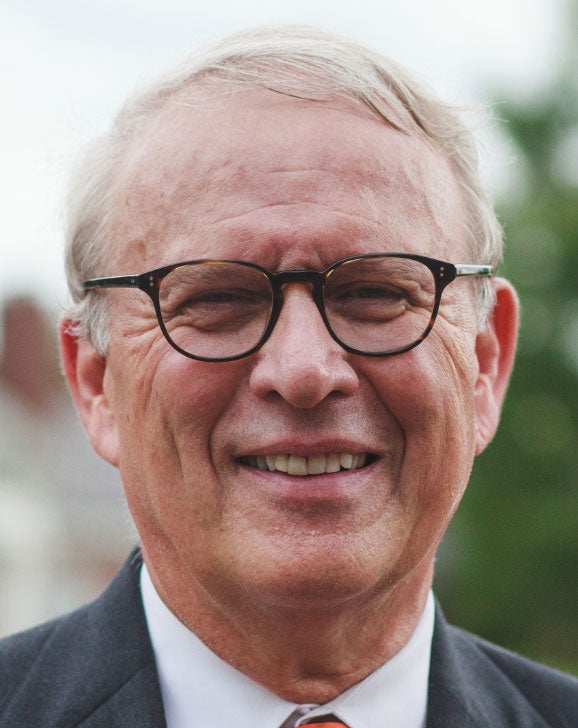It’s genuinely amazing how quickly one’s whole life can change.
Seven years ago, I was in my 14th year as chief of the Division of Child and Adolescent Psychiatry and Psychology at the University of Louisville in Kentucky. I’d worked with many dedicated colleagues to build a strong and respected program. My prior three annual evaluations featured perfect marks, and I’d been blessed with many warm accolades from my students and fellow physicians.

Dr. Allan M. Josephson (Photo courtesy of Alliance Defending Freedom)
That fall, I spoke at an event sponsored by The Heritage Foundation focusing on a straightforward and timely question: How best to treat children diagnosed with gender dysphoria (i.e., boys who wonder whether they’re girls, and girls who wonder whether they’re boys).
As a medical professional who cares about my patients, my answer was simple, obvious, and innocuous. We must start by finding out the cause of the child’s confusion and resolving any emotional problems before considering more invasive, risky treatments.
It seemed a reasonable enough response. According to the scientific method, every study begins with questions. One of the first is: “Why?” If a patient complains of chest pain, a heart doctor tries to determine what’s causing the pain, exploring several possibilities before confirming a diagnosis and commencing treatment.
That is, and always has been, Medicine 101.
But in the days following my remarks, no one asked whether my suggestion made sense or about my experience and observations in dealing with children who suffer dysphoria. Instead, people leapt to conclusions.
Quickly, red flags went up on campus. Officials at the LGBT Center initiated a campaign to have me punished. Some colleagues became upset. People suddenly noticed that I had served as an expert witness in cases where school officials were opening showers, restrooms, and locker rooms to students based on their professed gender identity, rather than their biological sex.
Professionally speaking, I had strong reservations about such policies and said so.
More red flags: Some faculty demanded that I apologize for my views—but they didn’t say to whom. Others remained silent, knowing which way the cultural winds were blowing. I was stunned to realize I was actually being punished for doing what I was paid to do; namely, think and speak.
But unfortunately, many professors have found themselves in similar predicaments over the years. The University of Illinois fired Kenneth Howell for sharing the Catholic Church’s teachings on same-sex marriage—in a class on Catholicism. The University of North Carolina at Wilmington denied Mike Adams a promotion for writing conservative political columns on his own time. Shawnee State University punished Nicholas Meriwether for not referring to a male student as a woman, with feminine titles and pronouns.
Tolerance—a word these universities frequently profess—must, by definition, be a two-way street. But in modern academia, those who won’t conform to left-wing politics are mostly being run off the road.
Just weeks after I spoke at The Heritage Foundation, I was demoted from my role as division chief. After that, I was ostracized, stripped of my teaching duties, and subjected to other forms of hostility. And about a year later, the university refused to renew my contract—in effect, firing me.
That was after 14 successful years rebuilding and leading the division, three years with perfect reviews, no disruptions in the division’s work, and no problems recruiting new faculty.
I wasn’t fired for poor management, teaching, or unprofessional conduct. The university ended my career because I elected not to surf the current wave of social activism, because I expressed views—supported by scientific literature and clinical experience—that the university found politically incorrect, and because, in my case, activism trumped academic thought, the search for the truth, and the well-being of patients.
Worse still, by what it did to me, our university communicated to students and faculty things that should be unthinkable in higher education: “Don’t ask questions or listen to anyone with a different point of view.”
Those are about the worst possible lessons we can impress upon those who will one day lead our communities or care for vulnerable patients.
The good news is a growing number of courts and experts are recognizing the truth of what I said seven years ago. Recent studies in the United Kingdom have raised serious questions about how doctors and psychologists are treating children with gender dysphoria, and American courts have affirmed the school privacy policies I defended.
Happily, the courts are also recognizing how unjustly I was treated. Last year, in a case I filed against University of Louisville officials through my attorneys with Alliance Defending Freedom over the violation of my constitutional rights and seeking reinstatement of my position with back pay, a federal district court ruled a jury should hear my claims. And on Sept. 10, the U.S. Court of Appeals for the 6th Circuit agreed.
The court wrote: “Josephson has shown that he engaged in protected speech when he spoke as part of the Heritage Foundation panel. Defendants should have known that Josephson’s speech was protected and that retaliating against Josephson for his speech would violate his First Amendment rights.”
The 6th Circuit recognized what the University of Louisville does not; namely, that under our Constitution, all of us—professors or not—should be free to speak our professional and personal views without fear of punishment or retaliation.
We publish a variety of perspectives. Nothing written here is to be construed as representing the views of The Daily Signal.
The post What a Federal Appeals Court Gets—but the University of Louisville Doesn’t appeared first on The Daily Signal.


0 Comments